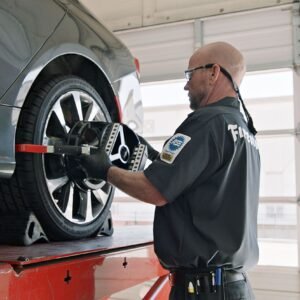Winter in New York brings a unique set of challenges for drivers, from freezing temperatures to icy roads and snowstorms. These conditions can negatively impact car performance, making it essential to take proactive measures to ensure your vehicle performs well during these harsh months. In this article, we’ll explore the best practices for maintaining car performance in winter, focusing on cold weather car maintenance and ensuring that your car stays reliable and efficient through the NY winter season.
This article was written by the expert team at Watancar Motors Store to help you maintain optimal car performance during the winter months in New York’s harsh weather
Understanding the Impact of Winter on Car Performance in NY
The cold weather in New York affects various aspects of your car’s performance. From battery health to tire traction, winter weather introduces factors that can strain your vehicle’s components. By understanding these challenges, you can prepare your car to handle the seasonal elements and maintain peak performance throughout the winter. In this section, we’ll delve into how the cold impacts different parts of your car and how you can mitigate these issues to maintain car performance in winter.
Winter Car Performance NY: Why Preparation is Key
When it comes to winter driving in New York, preparation is essential. The cold temperatures can cause issues like reduced tire pressure, sluggish engine performance, and weakened battery power. To combat these problems, it’s important to use the right winter tires, regularly check fluid levels, and perform routine maintenance. By addressing these issues early on, you can ensure that your car will run smoothly even when the temperature drops.
Cold Weather Car Maintenance in NY: Top Tips
Cold weather car maintenance is crucial in preventing breakdowns during the winter months. One of the most important aspects is to ensure that your vehicle’s fluids are properly maintained. Cold temperatures can thicken oil and reduce its ability to lubricate the engine. Ensure you’re using the right type of oil for winter and check your antifreeze levels regularly to avoid engine trouble. Additionally, ensure your windshield wipers are in good condition to handle snow and ice buildup.
Choosing the Right Winter Tires for Car Performance
Tires play a critical role in winter driving, especially in snowy and icy conditions. Winter tires are designed with special tread patterns that provide better traction in cold weather, reducing the risk of slipping on slick roads. When shopping for winter tires, it’s essential to consider factors like the tire’s tread depth, rubber composition, and overall durability. Using the right tires for winter conditions is one of the best ways to ensure your car’s performance in winter in NY.
Checking and Maintaining Your Car Battery in Cold Weather
A car battery’s performance is often tested during the winter months. Cold temperatures can cause the battery to lose power, leading to starting issues. To prevent this, ensure that your battery is clean and properly charged. If your battery is older than three years, consider replacing it before the cold weather sets in. Regularly checking the battery’s voltage and cleaning any corrosion will help maintain car performance in winter and prevent battery failure during those frigid mornings.
Winter Car Fluids: Why They Matter
Ensuring your car’s fluids are up to par is vital during the winter season. Cold weather can cause fluids to thicken, reducing their effectiveness. Ensure you’re using winter-grade motor oil, as it flows more easily in low temperatures. Additionally, make sure your antifreeze levels are adequate to prevent freezing in the radiator. Don’t forget about brake fluid and power steering fluid, which should be checked and topped off before the season’s first frost.

The Importance of Car Heating and Defrosting Systems
A functioning heating and defrosting system is essential for safe winter driving. In addition to providing comfort during chilly mornings, your car’s heating system helps clear the windshield of frost, improving visibility. Ensure your car’s heater is working properly and that the defrosting system is free of any obstructions. Maintaining these systems will not only keep you comfortable but will also enhance your visibility and driving safety in winter conditions.
Monitoring Tire Pressure in Winter
Tire pressure tends to drop in cold weather, which can affect your car’s handling and fuel efficiency. Low tire pressure can also increase the risk of tire damage. It’s important to check tire pressure regularly during the winter months and inflate them as needed. Maintaining proper tire pressure will help improve traction, ensuring better performance on icy or snowy roads in New York.
Checking Your Car’s Alignment and Suspension
Proper car alignment is essential for maintaining control and stability on slippery winter roads. If your car’s alignment is off, you may experience uneven tire wear, which can be dangerous during winter conditions. Make sure to have your car’s alignment and suspension checked before winter hits, as misalignment can worsen traction and handling. A properly aligned vehicle will handle better on snowy or icy roads, ensuring safe and reliable winter driving.
How to Keep Your Car Clean During the Winter Months
Salt and dirt from snow and ice can build up on your car during the winter, leading to rust and corrosion over time. Regularly washing your car, especially the undercarriage, can help prevent this buildup and protect your vehicle from damage. It’s also important to keep your windshield and mirrors clean for optimal visibility. Using a wax coating on your car can also provide an additional layer of protection against salt and moisture.
Do Cars Run Better in the Cold?
While extreme cold weather can be hard on cars, it doesn’t necessarily mean your car won’t run at all. Cold temperatures can make engines more sluggish, but with the right maintenance, your car can still perform efficiently. Ensuring your car’s oil and fluids are winter-ready, along with using the correct tires, can mitigate most of the cold-weather challenges.
Do Performance Tires Work in Winter?
Performance tires are designed for dry and warm weather conditions and may not provide adequate traction in snowy or icy conditions. In winter, it’s essential to switch to winter tires, as they have deeper treads and are made from rubber compounds that perform better in cold temperatures.
Which Cars Are Best for Winter Weather?
Cars with all-wheel drive or four-wheel drive are typically better suited for winter driving. These vehicles offer better traction on snow and ice, improving handling in slippery conditions. Sedans and smaller cars may struggle more in the winter, particularly in areas with heavy snowfall, but choosing a model that’s built for winter conditions can make a significant difference.
What Temperature Do Cars Perform Best?
Most cars perform optimally in temperatures between 60°F and 90°F (15°C and 32°C). However, with proper maintenance, cars can still function well in colder temperatures. Ensuring that fluids are winter-ready and that you have the right tires can make all the difference in keeping your car running smoothly during colder months.
Conclusion: Maintaining Optimal Car Performance in NY Winters
In conclusion, maintaining your car’s performance during the New York winter months requires preparation and regular maintenance. By ensuring your vehicle is properly equipped for cold weather—whether it’s with winter tires, a fully charged battery, or the correct fluids—you can ensure that your car stays reliable and performs well in harsh winter conditions. Follow these tips to avoid breakdowns and ensure safe, efficient driving throughout the cold season.
Looking for reliable car repair services in the Bronx? Discover how to find the best repair shops near you for top-quality service and affordable rates. Click here for more!






